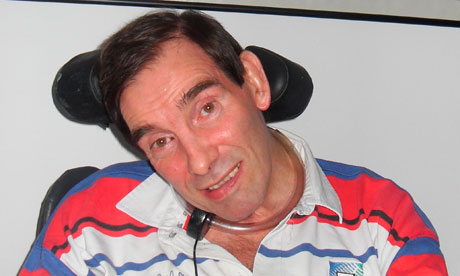An important case was heard today in the High Court from a sufferer of a debilitating disease who wanted the right to choose when and how we was going to die and to have a doctor euthanise him.
 It’s important because legal challenges of this sort are usually brought by people capable of taking their own lives who want to protect their loved ones from prosecution for facilitating their suicide whereas in this case the person in this case, whilst mentally sound and able to communicate his wishes, is physically incapable of taking his own life without intervention. What he is asking for is the right to choose the time that he wants to die and to ask someone to administer a lethal drug overdose.
It’s important because legal challenges of this sort are usually brought by people capable of taking their own lives who want to protect their loved ones from prosecution for facilitating their suicide whereas in this case the person in this case, whilst mentally sound and able to communicate his wishes, is physically incapable of taking his own life without intervention. What he is asking for is the right to choose the time that he wants to die and to ask someone to administer a lethal drug overdose.
The whole subject of assisted suicide or assisted dying is an emotive one and no answer will ever satisfy everyone but there are some very important principals at stake, primary of which is who actually owns your body. Whilst the state can deprive you of your possessions and your liberty, the one thing which is entirely yours and nobody else’s is your body. So why does the state presume to have the right to decide what you can and can’t do with your body if you are of sound mind?
Another important principle is that of free will. If a person decides to end their life they may legally do so (yes, it required an Act of Parliament to decriminalise suicide – feel free to have a WTF moment) but only if they end it themselves. If a person decides to end their life by having someone else pull the trigger, administer the dose or whichever method they choose then that is a criminal offence. That person has made the choice to end their life and chosen a method of doing it – why does it matter if they are the one holding the gun or the syringe or if they’ve got someone to do it for them? If you induce someone to carry out an illegal act you are guilty of that illegal act yourself so why is inducing someone to carry out an act that is legal for you to do illegal?
Tony Nicklinson is arguing that under the Human Rights Act, his right to life also includes the right to end it. The Ministry of Injustice is arguing that assisted dying is murder and if the courts rule otherwise they are changing the law and that is for Parliament to do, not the courts. The Ministry of Injustice is arguing against something that isn’t happening. Parliament makes law and the courts interpret it. Whether their interpretation is what was intended when a law was drafted or what Parliament wants is a moot point, it is how they interpret the law that counts. If they interpret the right to life in the Human Rights Act as the right not just to have a life but to own your own life then that is the law – not a change in the law but a ruling as to what the law actually means. It doesn’t matter that Parliament didn’t intend that to be the case, that’s their fault for making a law that doesn’t actually say what they meant it to say.
Terry Pratchett’s documentary on assisted suicide just over a year ago had quite a profound effect on me. I had long been of the opinion that if someone wanted to die then they should be allowed to do so and that if I was in the position where I had no quality of life I would want someone to do the honourable thing and put me out of my misery but I hadn’t actually seen someone take their own life in that way, nor had I really thought about how it would feel to be in that position. It took a couple of days for me to really think it through and come out unequivocally on the side of assisted suicide and assisted dying being right. I do think it is right and that’s my considered opinion having seen the really quite disturbing suicide of Craig Ewert and imagining myself in his place.
There are many moral and ethical arguments for and against assisted suicide and assisted dying but ultimately it boils down to your right to personal self determination. We can smoke and drink ourselves to death, we can put our lives in daily danger through extreme sports or high risk jobs like bomb disposal, we can gorge ourselves on fatal quantities of unhealthy food but we can’t choose to take our own lives peacefully and on our own terms at a time and place of our choosing? For me that’s just wrong and I wish Tony Nicklinson the best of luck in his appeal.


